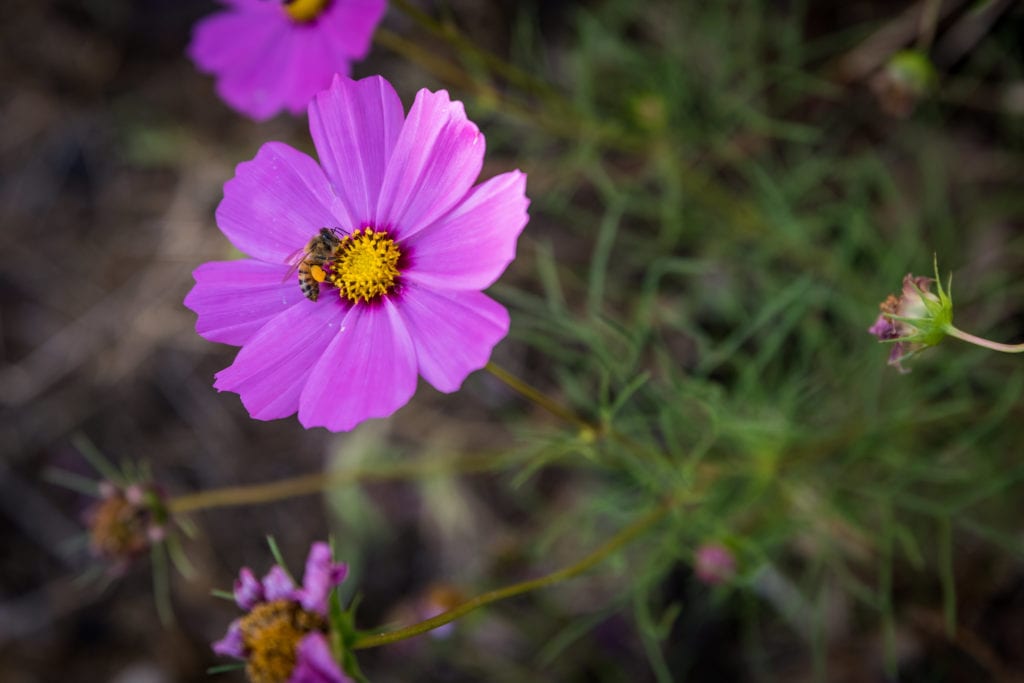
Plantings in Texas, Kansas, Illinois, and Florida educate communities and establish more forage
By Bayer and Joe Kertzman, managing editor, Badger Common’Tater
Sometimes, as Old Man Winter sets in, the snow falls and the ice forms, it’s nice to dream about springtime, the budding flowers, green grass and awakening of wildlife. But many of these natural spring events wouldn’t occur without the hard work put in by pollinators.
That’s why in the fall of 2016, the Bayer Feed a Bee program continued its efforts to promote pollinator health by providing bees with some of their favorite things—native wildflowers and dedicated areas of diverse forage options throughout the nation.
Feed a Bee and The Wildlife Society (TWS) embarked on a six-week autumn tour to establish additional pollinator forage at four locations across the United States.
Announced at TWS’ annual conference in Raleigh, North Carolina, October 15-19, approximately 50 million wildflower seeds were planted at strategic locations in Texas, Kansas, Illinois and Florida, where TWS has a robust regional presence.
“The Feed a Bee program is tackling a really important need for pollinators by conducting plantings across the nation,” said Ken Williams, chief executive officer of TWS.
“At TWS, dedicated chapter members in each region worked to identify the optimum mix of wildflower seeds to plant in each location to ensure pollinators have access to a wide variety of diverse nutrition sources when bloom occurs in the spring.”
BUSY SOCIAL NETWORKING BEES
The original goal established for the Feed a Bee program in 2016 was to generate enough social actions through “Tweet a 🐝🐝, #FeedABee” to plant 25 million pollinator-attractant wildflower seeds. Each share of the bee emoji and #FeedABee online triggered additional, real wildflower seeds being tallied for the fall plantings.
Thanks to overwhelming support from the public and partner organizations, the four plantings took place across enough land to plant 50 million wildflower seeds total.
Feed a Bee partners planting native wildflowers in the fall of 2016 included:
• Texas Tech University Department of Plant and Soil Science in Lubbock, Texas
• McCarty Family Farms in Scott City, Kansas
• Salem4youth in Flanagan, Illinois
• The Packers of Indian River in Fort Pierce, Florida.
The pollinator tour kicked off in October in Lubbock, Texas, where the Texas Tech University (TTU) Department of Plant and Soil Science hosted an educational pollinator field day that highlighted new native bee and habitat research being conducted by graduate students.
Attendees, including local growers, TTU students and representatives from the USDA Natural Resource Conservation Service also helped establish new forage areas for pollinators at the Quaker Avenue Research Farm, the 130-acre farm operated by the department.
“Pollinators, including native bees, honey bees and more, play an important role in agriculture and our ecosystem as a whole,” said Dr. Scott Longing, assistant professor of entomology at TTU and member of the Texas Chapter of TWS.
“By continuing to research ways to combat the challenges they face and planting additional forage in the meantime, we can help promote and protect pollinator health in a variety of ways,” he noted.
Now in its third year, Bayer’s Feed a Bee initiative has rallied more than 900,000 individuals and 117 partner organizations, including R.D. Offutt Company, to plant more than 2 billion wildflowers across the United States, creating and expanding forage areas for pollinators.
R.D. Offutt Company is a sixth-generation family farm headquartered in North Dakota that plants 50,000-60,000 acres of potatoes a year. At the 2017 Potato Expo in San Francisco, January 4-6, the farming operation reaffirmed its commitment to supporting pollinator health by leveraging its potato-producing land to create more forage for honey bees and other pollinators.
Since 2015, R.D. Offutt Company has planted wildflowers in collaboration with Feed a Bee and other forage initiatives on over 1,200 acres of its farms’ dry pivot corners and is expanding it forage footprint, planting 250 more acres in 2017, which equates to upwards of 500,000 wildflowers.
SMALL BUT MIGHTY
“Honey bees and other pollinators are small but mighty, playing an essential role in pollinating the many fruits, nuts and vegetables that contribute to a healthy diet,” said Vincent Restucci, director of Procurement & Business Technology at R.D. Offutt Company.
“Protecting pollinators is critical to the future of the world’s food supply, and through the Feed a Bee partnership with Bayer, we’re working together to promote and preserve the overall health of pollinator species for generations to come,” he explained.
While potato plants are not pollinated by bees, potato growers can play a strategic role in providing pollinators sustainable habitats and diverse food sources—necessities for thriving pollinator populations.
With strategic wildflower plantings through Feed a Bee, potato farmers have a unique opportunity to protect pollinators, promote land stewardship, and enhance agricultural sustainability.
“We decided to respond to all the talk about pollinators with action and go out and commit resources [land, equipment and people] to make it happen,” Restucci remarked. “It helps us to be a good neighbor in the communities in which we farm.”
“We have planted wildflowers in Minnesota, North Dakota and South Dakota,” he added. “We not only plant them on pivot corners, but also along paths and walkways, near hospitals and roadsides, under powerlines, or areas where we cannot economically farm commercial crops.”
Restucci says R.D. Offutt Company has provided seed to other farmers and put Bayer in contact with those who want to participate in the program.
“Our Feed a Bee partners are critical to enhancing forage opportunities for pollinators and preserving the agricultural options available to us today, especially as the population increases,” said Dr. Becky Langer, manager of the North American Bee Care Program.
POLLINATOR PASSION
“We are passionate about working with R.D. Offutt Company and other partners from all sectors to continue spreading awareness of the importance of pollinators and the adequate forage they need to flourish,” Langer added.
Bayer has established Bee Care Centers in North America and Europe to promote and protect the health of pollinators through research, education, partnerships and stewardship.
Complementing the North American Bee Care Center are three dedicated field technology stations designed to ensure Bayer’s research efforts include a representative perspective of North American apiculture.
“For nearly 30 years, Bayer has been dedicated to understanding the science, implementing the stewardship and finding the solutions that help keep bees safe and healthy,” Langer said. “We have a full research program focused on pest/pathogens and best management practices for beekeepers.”
Langer adds, “Pollinators need access to diverse sources of food and nutrition to be properly nourished and better able to withstand the multiple stressors they face. Individuals can get involved by planting wildflower seeds of their own to establish more forage for pollinators. Every little bit helps, whether it is a flower pot, a blooming shrub, a tree or acres of land.”
In addition to R.D. Offutt Company, the National Potato Council has also partnered with Bayer and TWS on the Feed a Bee initiative.
“Partners may include farmers; golf courses; hospitals; schools/colleges; cities; conservation organizations [i.e. The Wildlife Society, Pheasants Forever and the National Wild Turkey Federation]; churches/non-profits; lawn care companies; industry organizations; beekeepers; pest control companies; master gardeners; seed companies; utility companies; departments of transportation and individuals,” Langer suggested.
“R.D. Offutt Company strives to be good stewards of the resources we have been entrusted with. We want to leave them in better shape for future generations,” Restucci commented. “It just makes sense to do all we can for the environment.”
“We have no plans to stop participating in this program,” he concluded. “We continually monitor the habitats and are working with etymologists to understand the positive impact we are having to agriculture and pollinator health.”
For more information or to pledge to plant pollinator patches, visit www.FeedABee.com. To learn more about Bayer bee health initiatives, including Feed a Bee, please visit: www.Beehealth.Bayer.us.


